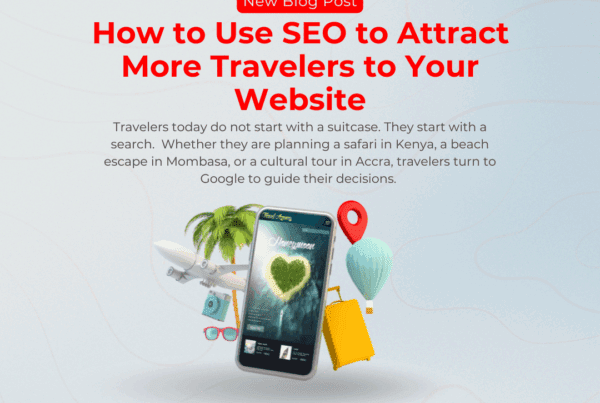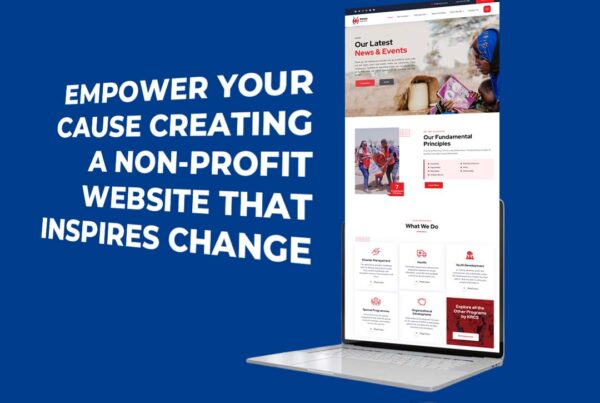Welcome to the ultimate guide on setting up a website in Kenya! Whether you’re an entrepreneur, a small business owner, or a hobbyist, having a website is crucial in today’s digital age. With the right tools and knowledge, you can easily establish an online presence to reach a wider audience and grow your brand.
| 8 Steps on how to create a website in Kenya |
|---|
| 1. Choose the perfect domain name |
| 2. Select a reliable web hosting provider |
| 3. Design your website: DIY or hire a professional |
| 4. Add essential elements to your website: navigation, content, and visuals |
| 5. Optimize your website for search engines |
| 6. Integrate payment gateways for online transactions |
| 7. Promote your website: digital marketing strategies for Kenyan businesses |
| 8. Launch your website and cater to ongoing maintenance |
In this comprehensive guide, we will walk you through each step of the process, making it easy for you to set up your website in Kenya. From choosing the perfect domain name to selecting a reliable web hosting provider, we’ll cover it all. You’ll also learn about the different website builders available and how to create a visually appealing and user-friendly site.
But setting up a website doesn’t stop at design and development. We’ll delve into important aspects like search engine optimization (SEO), website security, and performance optimization to ensure your site not only looks great but also ranks well on search engines.
Don’t worry if you’re a complete beginner – we’ve got you covered. So, let’s dive in and get your website up and running in no time!
How to register a the perfect domain name in Kenya
Your domain name is your website’s address on the internet, for example our domain name is, www.charleson.co.ke. It’s what people will type into their web browser to visit your site. To register a domain name in Kenya, it’s important to consider the following factors:
- Relevance: Your domain name should be relevant to your website’s content and purpose.
- Brevity: Shorter domain names are easier to remember and type.
- Memorability: Choose a domain name that is easy to pronounce and spell.
- Availability: Check to make sure that your desired domain name is available for registration.
To register a domain name, you can use a domain registrar such as GoDaddy or Namecheap. Once you’ve registered your domain name, you’ll need to point it to your web hosting provider.
Choosing Between a .com and a .co.ke Domain Extension
When starting a business, choosing the right domain name is crucial for establishing a strong online presence. Among the various domain extensions available, .com and .co.ke are two popular options for businesses in Kenya. While both extensions can serve as effective domain names, the choice between them depends on the specific goals and target audience of the business.
.com Domain: Ideal for Global Reach
The .com domain is the most widely recognized and used domain extension globally. It is associated with established businesses and professionalism, making it an excellent choice for companies that aim to reach an international audience. If your business targets customers worldwide, a .com domain will provide instant recognition and credibility.
Advantages of a .com Domain:
- Global Recognition: .com domains are instantly recognizable worldwide, making your business accessible to a global audience.
- Credibility and Trustworthiness: .com domains are often associated with established businesses, giving your brand a sense of legitimacy and trustworthiness.
- SEO Benefits: .com domains are generally considered to have a slight SEO advantage, making it easier for search engines to index your website.
.co.ke Domain: Tailor-Made for Local Presence
The .co.ke domain is the country code top-level domain (ccTLD) for Kenya. It specifically identifies websites associated with Kenya, making it ideal for businesses that primarily serve Kenyan customers. If your target audience is primarily located in Kenya, a .co.ke domain will provide a clear indication of your local focus.
Advantages of a .co.ke Domain:
- Target Audience Recognition: .co.ke domains instantly signal to Kenyan users that your business is Kenyan-based, fostering trust and familiarity.
- Local Search Optimization: Search engines may give a slight preference to websites with a .co.ke domain when users search for local businesses.
- Brand Identity: A .co.ke domain can strengthen your brand’s association with Kenya, emphasizing your commitment to the local market.
Choosing the Right Domain for Your Business
The choice between a .com domain and a .co.ke domain depends on your business’s target audience and goals. If you aim to reach an international audience, a .com domain is the clear choice. However, if your business primarily serves Kenyan customers, a .co.ke domain will provide a stronger local connection.
Here’s a summary to help you decide:
- International Audience: Choose a .com domain for global reach and recognition.
- Local Kenyan Audience: Choose a .co.ke domain for local presence and trust.
- Hybrid Approach: Consider using both a .com and .co.ke domain to maximize global and local visibility.
Remember, your domain name is a crucial part of your online identity. Choose one that aligns with your business goals, target audience, and overall brand strategy.
Selecting a reliable a web hosting provider
A web hosting provider is a company that stores your website’s files and makes them accessible to visitors. There are many different web hosting providers to choose from, so it’s important to compare their prices, features, and customer support before you make a decision.
When choosing a web hosting provider, consider the following factors:
- Price: Web hosting plans can range in price from a few dollars per month to hundreds of dollars per month. Choose a plan that fits your budget and needs.
- Features: Different web hosting providers offer different features, such as disk space, bandwidth, email accounts, and databases. Make sure that the plan you choose has the features you need.
- Customer support: It’s important to choose a web hosting provider with good customer support. This is especially important if you’re new to web hosting and need help getting started.
How to create a website in Kenya: DIY or hiring a professional
One of the first decisions you’ll need to make when creating a website is whether to design it yourself or hire a professional. While there are plenty of website builders available that make it easy for anyone to create a site, hiring a professional can give you a more polished and customized result.
If you choose to design your website yourself, there are several website builders available in Kenya such as WordPress, Wix, Webflow, Shopify, and Squarespace. Each of these platforms has its own strengths and weaknesses, so it’s important to choose one that aligns with your needs and skill level.
If you decide to hire a professional, there are several options available in Kenya. You can search for web design agencies in Kenya or freelancers on platforms such as Upwork or Fiverr. CHARLESON® Marketing Agency is your trusted partner for professional web design services. With our wide portfolio and rave reviews, you can be confident that we have the experience and skills to create the website you envision.
No matter which route you choose, it’s important to keep in mind the essential elements of a website to ensure it’s user-friendly and visually appealing.
Essential elements of a website: navigation, content, and visuals
When designing your website, it’s important to keep in mind the essential elements that make it user-friendly and visually appealing. These elements include navigation, content, and visuals.
Navigation refers to how easy it is for users to move around your website. This includes having a clear and organized menu, easy-to-find search bar, and logical page hierarchy. It’s important to make it easy for users to find what they’re looking for, as a frustrating user experience can lead to high bounce rates and lower search engine rankings.
Content is the main reason users visit your website, so it’s important to ensure it’s high quality and relevant. This includes having a clear and concise homepage that explains your business or organization, as well as informative and engaging pages that provide value to your audience. It’s also important to incorporate keywords and phrases relevant to your business to improve your search engine rankings.
Visuals are an important part of website design, as they can help engage users and make your site more visually appealing. This includes using high-quality images and videos, as well as an attractive color scheme and typography. It’s important to keep in mind the user experience when incorporating visuals, as slow load times or distracting elements can lead to a negative experience.
Optimizing your website for search engines
SEO is the process of improving your website’s visibility on search engines like Google. By optimizing your website for keywords and phrases relevant to your business, you can improve your search engine rankings and increase organic traffic to your site.
One of the most important aspects of Search Engine Optimization (SEO) is keyword research. This involves identifying the keywords and phrases your target audience is searching for, and incorporating them into your website’s content. This includes your homepage, product or service pages, and blog posts.
It’s also important to ensure your website is mobile-friendly, as Google prioritizes mobile-friendly sites in its search rankings. This includes having a responsive design that adjusts to different screen sizes, as well as fast load times and easy-to-use navigation.
Other important aspects of SEO include meta descriptions, title tags, and header tags. These elements provide context to search engines about the content on your website, and can help improve your search engine rankings.
Integrating payment gateways for online transactions
If you’re running an e-commerce website, it’s important to integrate payment gateways to ensure your customers can easily make online transactions. In Kenya, popular payment gateways include M-Pesa, Airtel Money, and debit card processing platforms such as Mastercard & Visa.
When choosing a payment gateway, it’s important to keep in mind factors such as transaction fees, ease of use, and security. You’ll also need to ensure your website is SSL certified, which encrypts sensitive information and provides a secure connection between your website and your customers’ browsers.
It’s also important to have a clear and concise refund policy, as well as an easy-to-use shopping cart and checkout system. This can help improve the user experience and increase sales on your website.
Promoting your website: digital marketing strategies for Kenyan businesses
Once your website is up and running, it’s important to promote it to reach a wider audience. There are several digital marketing strategies available to Kenyan businesses, including social media marketing, email marketing, and search engine marketing.
Social media marketing involves using platforms such as Facebook, Twitter, and Instagram to promote your website and engage with your audience. This includes posting regularly, responding to comments and messages, and using paid advertising to reach a wider audience.
Email marketing involves sending newsletters and promotional emails to your subscribers to keep them informed about your business and new offerings. This can help build brand loyalty and increase sales on your website.
Search engine marketing involves using paid advertising to appear at the top of search engine results pages. This can help increase visibility and drive traffic to your website, but it’s important to keep in mind factors such as budget and target audience when creating your campaign.
Website Design Prices in Kenya
The cost of website design (web development) in Kenya ranges from KSH 10,000 to KSH 200,000 or more, depending on a number of factors, including; the size and complexity of the website, the experience of the designer, and the features and functionality required.
Cost of a Small Business Website in Kenya
A small business website typically has 5-10 pages and basic features such as a contact form and a map. The cost of a small business website in Kenya typically ranges from KSH 10,000 to KSH 30,000.
Cost of a Mid-Size Business Website in Kenya
A mid-size business website typically has 11-25 pages and more advanced features, such as e-commerce functionality and a blog. The cost of a mid-size business website in Kenya typically ranges from KSH 30,000 to KSH 100,000.
Cost of a Large Business Website in Kenya
A large business website typically has over 25 pages and complex features, such as a customer portal and a content management system (CMS). The cost of a large business website in Kenya typically ranges from KSH 100,000 to KSH 200,000 or more.
Additional Factors Affecting Website Design Costs
- The cost of domain registration and hosting.
- The cost of content creation, such as writing and photography.
- The cost of ongoing maintenance and updates.
How to Get a Website Design Quote
The best way to get a website design quote is to contact a web design company such as CHARLESON® and discuss your specific needs. Be prepared to provide information about your business, your target audience, and your budget.
Here are some tips for getting a good deal on professional website design services in Kenya:
- Be clear about your budget and expectations.
- Ask about the agency’s portfolio of work.
- Make sure the agency is a good fit for your business.
Conclusion: Launching your website and ongoing maintenance
Setting up a website in Kenya doesn’t have to be a daunting task. By following the steps outlined in this guide, you can easily establish an online presence to reach a wider audience and grow your brand.
Remember to keep in mind the essential elements of a website, including navigation, content, and visuals, as well as important aspects like SEO and website security. By optimizing your website for search engines and integrating payment gateways for online transactions, you can improve the user experience and increase sales on your website.
And once your website is up and running, it’s important to continue promoting it with digital marketing strategies such as social media marketing and email marketing. With the right tools and knowledge, you can launch your website in no time and continue to maintain and grow it over time.
Need help developing your website? Contact CHARLESON® Marketing Agency on Phone, Email or WhatsApp and one of our agents will be sure to cater to your inquiries.





Hello I want to create a website
Hello would love to help out